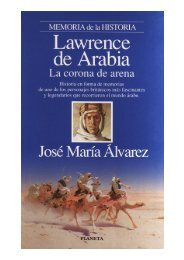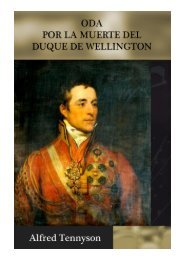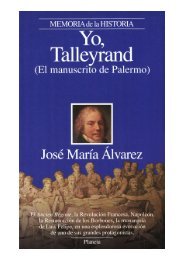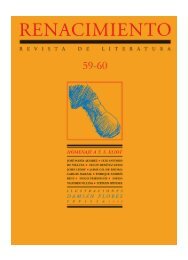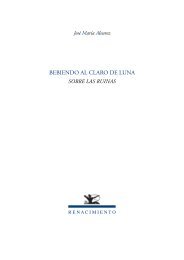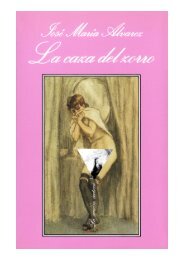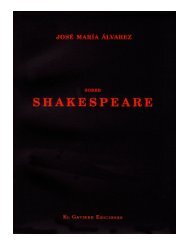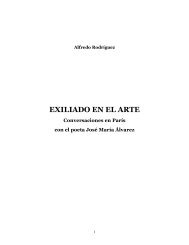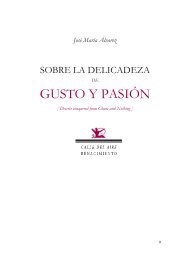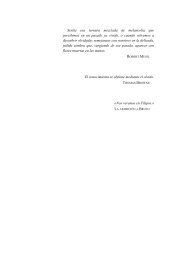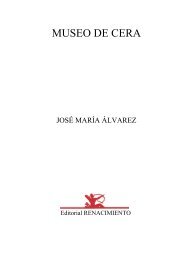- Page 1 and 2:
1 AL OTRO LADO DEL ESPEJO. JOSÉ MA
- Page 3 and 4:
3 AL OTRO LADO DEL ESPEJO. JOSÉ MA
- Page 5 and 6:
5 AL OTRO LADO DEL ESPEJO. JOSÉ MA
- Page 7 and 8:
7 AL OTRO LADO DEL ESPEJO. JOSÉ MA
- Page 9 and 10:
9 AL OTRO LADO DEL ESPEJO. JOSÉ MA
- Page 11 and 12:
I CONVERSACIÓN Cartagena, verano d
- Page 13 and 14:
13 AL OTRO LADO DEL ESPEJO. JOSÉ M
- Page 15 and 16:
15 AL OTRO LADO DEL ESPEJO. JOSÉ M
- Page 17 and 18:
17 AL OTRO LADO DEL ESPEJO. JOSÉ M
- Page 19 and 20:
19 AL OTRO LADO DEL ESPEJO. JOSÉ M
- Page 21 and 22:
II CONVERSACIÓN Cartagena, verano
- Page 23 and 24:
23 AL OTRO LADO DEL ESPEJO. JOSÉ M
- Page 25 and 26:
25 AL OTRO LADO DEL ESPEJO. JOSÉ M
- Page 27 and 28:
27 AL OTRO LADO DEL ESPEJO. JOSÉ M
- Page 29 and 30:
unidos y viéndonos siempre que pod
- Page 31 and 32:
Con todas las palabras de la lucha
- Page 33 and 34:
33 AL OTRO LADO DEL ESPEJO. JOSÉ M
- Page 35 and 36:
35 AL OTRO LADO DEL ESPEJO. JOSÉ M
- Page 37 and 38:
37 AL OTRO LADO DEL ESPEJO. JOSÉ M
- Page 39 and 40:
III CONVERSACIÓN Cartagena, verano
- Page 41 and 42:
41 AL OTRO LADO DEL ESPEJO. JOSÉ M
- Page 43 and 44:
43 AL OTRO LADO DEL ESPEJO. JOSÉ M
- Page 45 and 46:
45 AL OTRO LADO DEL ESPEJO. JOSÉ M
- Page 47 and 48:
Ése es el campo de la música. Es
- Page 49 and 50:
49 AL OTRO LADO DEL ESPEJO. JOSÉ M
- Page 51 and 52:
51 AL OTRO LADO DEL ESPEJO. JOSÉ M
- Page 53 and 54:
53 AL OTRO LADO DEL ESPEJO. JOSÉ M
- Page 55 and 56:
55 AL OTRO LADO DEL ESPEJO. JOSÉ M
- Page 57 and 58:
57 AL OTRO LADO DEL ESPEJO. JOSÉ M
- Page 59 and 60:
59 AL OTRO LADO DEL ESPEJO. JOSÉ M
- Page 61 and 62:
61 AL OTRO LADO DEL ESPEJO. JOSÉ M
- Page 63 and 64:
Fue desterrado... 63 AL OTRO LADO D
- Page 65 and 66:
65 AL OTRO LADO DEL ESPEJO. JOSÉ M
- Page 67 and 68:
67 AL OTRO LADO DEL ESPEJO. JOSÉ M
- Page 69 and 70:
69 AL OTRO LADO DEL ESPEJO. JOSÉ M
- Page 71 and 72:
71 AL OTRO LADO DEL ESPEJO. JOSÉ M
- Page 73 and 74:
73 AL OTRO LADO DEL ESPEJO. JOSÉ M
- Page 75 and 76:
75 AL OTRO LADO DEL ESPEJO. JOSÉ M
- Page 77 and 78:
77 AL OTRO LADO DEL ESPEJO. JOSÉ M
- Page 79 and 80:
79 AL OTRO LADO DEL ESPEJO. JOSÉ M
- Page 81 and 82:
81 AL OTRO LADO DEL ESPEJO. JOSÉ M
- Page 83 and 84:
83 AL OTRO LADO DEL ESPEJO. JOSÉ M
- Page 85 and 86:
¿Qué nombre le hubiera gustado te
- Page 87 and 88:
¿Y del control de la natalidad? Ab
- Page 89 and 90:
¿Y el cine? Sí claro. Muchísimo.
- Page 91 and 92:
¿Se cree suficientemente informado
- Page 93 and 94:
Se trata de una cosa mucilaginosa q
- Page 95 and 96:
95 AL OTRO LADO DEL ESPEJO. JOSÉ M
- Page 97 and 98:
97 AL OTRO LADO DEL ESPEJO. JOSÉ M
- Page 99 and 100:
Esa frasecita tiene un regusto fasc
- Page 101 and 102:
101 AL OTRO LADO DEL ESPEJO. JOSÉ
- Page 103 and 104:
103 AL OTRO LADO DEL ESPEJO. JOSÉ
- Page 105 and 106:
105 AL OTRO LADO DEL ESPEJO. JOSÉ
- Page 107 and 108:
107 AL OTRO LADO DEL ESPEJO. JOSÉ
- Page 109 and 110:
109 AL OTRO LADO DEL ESPEJO. JOSÉ
- Page 111 and 112:
111 AL OTRO LADO DEL ESPEJO. JOSÉ
- Page 113 and 114:
113 AL OTRO LADO DEL ESPEJO. JOSÉ
- Page 115 and 116:
115 AL OTRO LADO DEL ESPEJO. JOSÉ
- Page 117 and 118:
117 AL OTRO LADO DEL ESPEJO. JOSÉ
- Page 119 and 120:
119 AL OTRO LADO DEL ESPEJO. JOSÉ
- Page 121 and 122:
121 AL OTRO LADO DEL ESPEJO. JOSÉ
- Page 123 and 124:
123 AL OTRO LADO DEL ESPEJO. JOSÉ
- Page 125 and 126:
125 AL OTRO LADO DEL ESPEJO. JOSÉ
- Page 127 and 128:
127 AL OTRO LADO DEL ESPEJO. JOSÉ
- Page 129 and 130:
129 AL OTRO LADO DEL ESPEJO. JOSÉ
- Page 131 and 132:
No sé... Bueno, puede ser ¿y qué
- Page 133 and 134:
Dorado Di Oro La Fiesta es mía Poc
- Page 135 and 136:
135 AL OTRO LADO DEL ESPEJO. JOSÉ
- Page 137 and 138:
137 AL OTRO LADO DEL ESPEJO. JOSÉ
- Page 139 and 140:
139 AL OTRO LADO DEL ESPEJO. JOSÉ
- Page 141 and 142:
141 AL OTRO LADO DEL ESPEJO. JOSÉ
- Page 143 and 144:
143 AL OTRO LADO DEL ESPEJO. JOSÉ
- Page 145 and 146: la madera de las embarcaciones las
- Page 147 and 148: 147 AL OTRO LADO DEL ESPEJO. JOSÉ
- Page 149 and 150: Al menos sobre la pantalla nuestra
- Page 151 and 152: 151 AL OTRO LADO DEL ESPEJO. JOSÉ
- Page 153 and 154: 153 AL OTRO LADO DEL ESPEJO. JOSÉ
- Page 155 and 156: 155 AL OTRO LADO DEL ESPEJO. JOSÉ
- Page 157 and 158: 157 AL OTRO LADO DEL ESPEJO. JOSÉ
- Page 159 and 160: 159 AL OTRO LADO DEL ESPEJO. JOSÉ
- Page 161 and 162: 161 AL OTRO LADO DEL ESPEJO. JOSÉ
- Page 163 and 164: 163 AL OTRO LADO DEL ESPEJO. JOSÉ
- Page 165 and 166: 165 AL OTRO LADO DEL ESPEJO. JOSÉ
- Page 167 and 168: 167 AL OTRO LADO DEL ESPEJO. JOSÉ
- Page 169 and 170: 169 AL OTRO LADO DEL ESPEJO. JOSÉ
- Page 171 and 172: 171 AL OTRO LADO DEL ESPEJO. JOSÉ
- Page 173 and 174: 173 AL OTRO LADO DEL ESPEJO. JOSÉ
- Page 175 and 176: SALVACIÓN EN EL ESPLENDOR 175 AL O
- Page 177 and 178: Nos encontramos a tres años de la
- Page 179 and 180: 179 AL OTRO LADO DEL ESPEJO. JOSÉ
- Page 181 and 182: 181 AL OTRO LADO DEL ESPEJO. JOSÉ
- Page 183 and 184: 183 AL OTRO LADO DEL ESPEJO. JOSÉ
- Page 185 and 186: Pues no será conmigo. 185 AL OTRO
- Page 187 and 188: 187 AL OTRO LADO DEL ESPEJO. JOSÉ
- Page 189 and 190: 189 AL OTRO LADO DEL ESPEJO. JOSÉ
- Page 191 and 192: 191 AL OTRO LADO DEL ESPEJO. JOSÉ
- Page 193 and 194: 193 AL OTRO LADO DEL ESPEJO. JOSÉ
- Page 195: 195 AL OTRO LADO DEL ESPEJO. JOSÉ
- Page 199 and 200: 199 AL OTRO LADO DEL ESPEJO. JOSÉ
- Page 201 and 202: Y esos abismos Del Mal, no mueren c
- Page 203 and 204: 203 AL OTRO LADO DEL ESPEJO. JOSÉ
- Page 205 and 206: Yo creo que lo que se está formand
- Page 207 and 208: Pero eso llevaría sin duda hacia u
- Page 209 and 210: 209 AL OTRO LADO DEL ESPEJO. JOSÉ
- Page 211 and 212: 211 AL OTRO LADO DEL ESPEJO. JOSÉ
- Page 213 and 214: 213 AL OTRO LADO DEL ESPEJO. JOSÉ
- Page 215 and 216: 215 AL OTRO LADO DEL ESPEJO. JOSÉ
- Page 217 and 218: 217 AL OTRO LADO DEL ESPEJO. JOSÉ
- Page 219 and 220: 219 AL OTRO LADO DEL ESPEJO. JOSÉ
- Page 221 and 222: 221 AL OTRO LADO DEL ESPEJO. JOSÉ
- Page 223 and 224: 223 AL OTRO LADO DEL ESPEJO. JOSÉ
- Page 225 and 226: 225 AL OTRO LADO DEL ESPEJO. JOSÉ
- Page 227 and 228: 227 AL OTRO LADO DEL ESPEJO. JOSÉ
- Page 229 and 230: 229 AL OTRO LADO DEL ESPEJO. JOSÉ
- Page 231 and 232: 231 AL OTRO LADO DEL ESPEJO. JOSÉ
- Page 233 and 234: 233 AL OTRO LADO DEL ESPEJO. JOSÉ
- Page 235 and 236: 235 AL OTRO LADO DEL ESPEJO. JOSÉ
- Page 237 and 238: 237 AL OTRO LADO DEL ESPEJO. JOSÉ
- Page 239 and 240: 239 AL OTRO LADO DEL ESPEJO. JOSÉ
- Page 241 and 242: 241 AL OTRO LADO DEL ESPEJO. JOSÉ
- Page 243 and 244: 243 AL OTRO LADO DEL ESPEJO. JOSÉ
- Page 245 and 246: 245 AL OTRO LADO DEL ESPEJO. JOSÉ
- Page 247 and 248:
247 AL OTRO LADO DEL ESPEJO. JOSÉ
- Page 249 and 250:
Sí. Salgo cuando voy al cine o a c
- Page 251 and 252:
251 AL OTRO LADO DEL ESPEJO. JOSÉ
- Page 253 and 254:
253 AL OTRO LADO DEL ESPEJO. JOSÉ
- Page 255 and 256:
Y esperar a que la policía Tire la
- Page 257 and 258:
257 AL OTRO LADO DEL ESPEJO. JOSÉ
- Page 259 and 260:
Como MUSEO, su visita conlleva dolo
- Page 261 and 262:
261 AL OTRO LADO DEL ESPEJO. JOSÉ
- Page 263 and 264:
263 AL OTRO LADO DEL ESPEJO. JOSÉ
- Page 265 and 266:
265 AL OTRO LADO DEL ESPEJO. JOSÉ
- Page 267 and 268:
267 AL OTRO LADO DEL ESPEJO. JOSÉ
- Page 269 and 270:
269 AL OTRO LADO DEL ESPEJO. JOSÉ
- Page 271 and 272:
271 AL OTRO LADO DEL ESPEJO. JOSÉ
- Page 273 and 274:
273 AL OTRO LADO DEL ESPEJO. JOSÉ
- Page 275 and 276:
275 AL OTRO LADO DEL ESPEJO. JOSÉ
- Page 277 and 278:
277 AL OTRO LADO DEL ESPEJO. JOSÉ
- Page 279 and 280:
279 AL OTRO LADO DEL ESPEJO. JOSÉ
- Page 281 and 282:
281 AL OTRO LADO DEL ESPEJO. JOSÉ
- Page 283 and 284:
283 AL OTRO LADO DEL ESPEJO. JOSÉ
- Page 285 and 286:
285 AL OTRO LADO DEL ESPEJO. JOSÉ
- Page 287 and 288:
287 AL OTRO LADO DEL ESPEJO. JOSÉ
- Page 289 and 290:
289 AL OTRO LADO DEL ESPEJO. JOSÉ
- Page 291 and 292:
291 AL OTRO LADO DEL ESPEJO. JOSÉ
- Page 293 and 294:
293 AL OTRO LADO DEL ESPEJO. JOSÉ
- Page 295 and 296:
295 AL OTRO LADO DEL ESPEJO. JOSÉ
- Page 297 and 298:
297 AL OTRO LADO DEL ESPEJO. JOSÉ
- Page 299 and 300:
Sí. Pero me gusta más su vida. Cr
- Page 301 and 302:
301 AL OTRO LADO DEL ESPEJO. JOSÉ
- Page 303 and 304:
303 AL OTRO LADO DEL ESPEJO. JOSÉ
- Page 305 and 306:
305 AL OTRO LADO DEL ESPEJO. JOSÉ
- Page 307 and 308:
307 AL OTRO LADO DEL ESPEJO. JOSÉ
- Page 309 and 310:
309 AL OTRO LADO DEL ESPEJO. JOSÉ
- Page 311 and 312:
Muy fría ¿Qué se hizo el rey don
- Page 313 and 314:
313 AL OTRO LADO DEL ESPEJO. JOSÉ
- Page 315 and 316:
315 AL OTRO LADO DEL ESPEJO. JOSÉ
- Page 317 and 318:
317 AL OTRO LADO DEL ESPEJO. JOSÉ
- Page 319 and 320:
Allen es como un viejo amigo; tanta
- Page 321 and 322:
No sé qué imagen. ¿Por qué no u
- Page 323 and 324:
323 AL OTRO LADO DEL ESPEJO. JOSÉ
- Page 325 and 326:
325 AL OTRO LADO DEL ESPEJO. JOSÉ
- Page 327 and 328:
327 AL OTRO LADO DEL ESPEJO. JOSÉ
- Page 329 and 330:
329 AL OTRO LADO DEL ESPEJO. JOSÉ
- Page 331 and 332:
331 AL OTRO LADO DEL ESPEJO. JOSÉ
- Page 333 and 334:
Elija. Elijo un buen cigarro. 333 A
- Page 335 and 336:
335 AL OTRO LADO DEL ESPEJO. JOSÉ
- Page 337 and 338:
337 AL OTRO LADO DEL ESPEJO. JOSÉ
- Page 339 and 340:
339 AL OTRO LADO DEL ESPEJO. JOSÉ
- Page 341:
341 AL OTRO LADO DEL ESPEJO. JOSÉ



